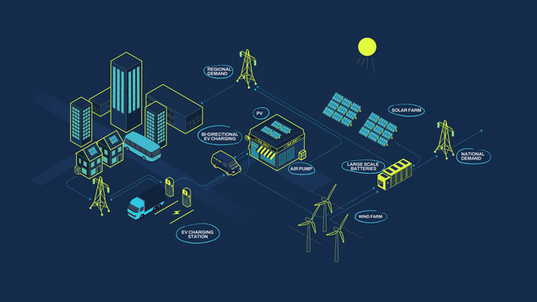Forward-thinking businesses should seize the opportunity to become providers and facilitators of clean electricity.
Some weeks ago, headlines celebrated that it's now cheaper to build new wind and solar projects to generate power in the US than to keep running 209 out of its 210 coal-powered plants. At the same time, BloombergNEF's analysis showed that for the first time in history, global investment in renewables had caught up with fossil fuels, at US$1.1tr.
Similarly, the trajectory of electric vehicles (EVs) is looking promising, with the number of electric cars growing year-on-year.
These are two important indicators that the world is transitioning to a net zero future, at least in terms of electricity. We've come a long way.
But we still have plenty to do. Despite the clear economic case for the net zero transition, we're facing a messy, uphill struggle through the noise of delay tactics and misinformation. We need to move a lot faster in scaling up market-ready technologies.
A new frontier we're facing is rethinking how consumers and businesses can use already available electricity solutions in a way that's fit for a 2050 world.
It's not just about replacing fossil fuel technology such as gas power stations and petrol and diesel cars with green equivalents, although that's fundamental. We need to think more broadly to ensure that our future renewable electricity system not just complements, but fully transforms the centralised fossil-based system.
Taken in isolation, many green technologies already make business sense. For example, switching commercial fleets to EVs can significantly reduce running costs. Similarly, companies are finding competitive advantage in switching to renewable electricity and energy efficient buildings.
But the real step change is when we start using these technologies together. A building that draws on the battery storage of electric cars plugged into its car park chargers could balance the variable input from a rooftop solar plant, or enable companies to sell electricity back to the grid at peak times. Similarly, at a city or grid scale, we can integrate the vast storage capacity of electric car-fleets with demand management and electricity production.
The first step in this journey is a mindset shift, with businesses moving from being consumers of electricity, to being provider, consumer and facilitator, all in one.
Many businesses have already started on this journey. Climate Group's RE100 members are responsible for 64TWh of renewable electricity coming from PPAs, alongside an additional 36TWh coming from direct contracts with suppliers. As early as 2016, RE100 member Ikea made a public commitment to become a net exporter of electricity by 2020. This trend is taking on greater sophistication as companies such as Google seek to achieve 100 per cent clean energy 24 hours a day.
Smart businesses are recognising that real benefits are available once they expand their thinking beyond their own immediate businesses, to their supply chain, surrounding communities, and even their competitors. This is not just paramount for businesses who see themselves as green, but for all - it's the future.
In the initiative Integrate To Zero Climate Group is working alongside businesses and regulators to understand and show how we can reach high levels of energy integration. What are the technologies and solutions, what do businesses, policymakers and citizens stand to gain, and how do we overcome what's standing in our way?
Some of these barriers are organisational - in large companies the net zero transition work can be as siloed as it is in the outside world. The fleet manager handles the transition to EVs, the facilities person is responsible for energy efficiency, and renewable energy procurement sits within the remit of the sustainability or energy team.
Companies need to make the connection between these issues, integrating net zero workstreams into one, comprehensible strategy on climate leadership - and reimagine the structure and skills that are needed to drive this forward at pace and scale.
Then there are national policies - or the lack of them. Governments can still force companies to take energy from the national grid, often without the option for renewables and a ban on generating their own energy - like in Indonesia. International businesses have a vital voice in pushing authorities to allow them to source their own green energy, utilise vehicle-to-grid technology, and enable 24/7 tracking of renewable electricity amongst other innovations.
And then there is the role of national policies as an incentive - governments need to identify effective tax breaks for innovation and the implementation of new technology that drives smart, integrated energy use. It's clear from the Inflation Reduction Act in the US that financial incentives work and can set chain reactions in motion like little else.
Companies, and governments, that have the strategic insight to embrace the net zero transition will be well placed to lead both commercially and environmentally. Replacing petrol and diesel fleets with EVs is one thing. Guiding your company into a strategic, integrated electricity future will help define the true leaders over the next decade.
This piece was originally published in Business Green.
